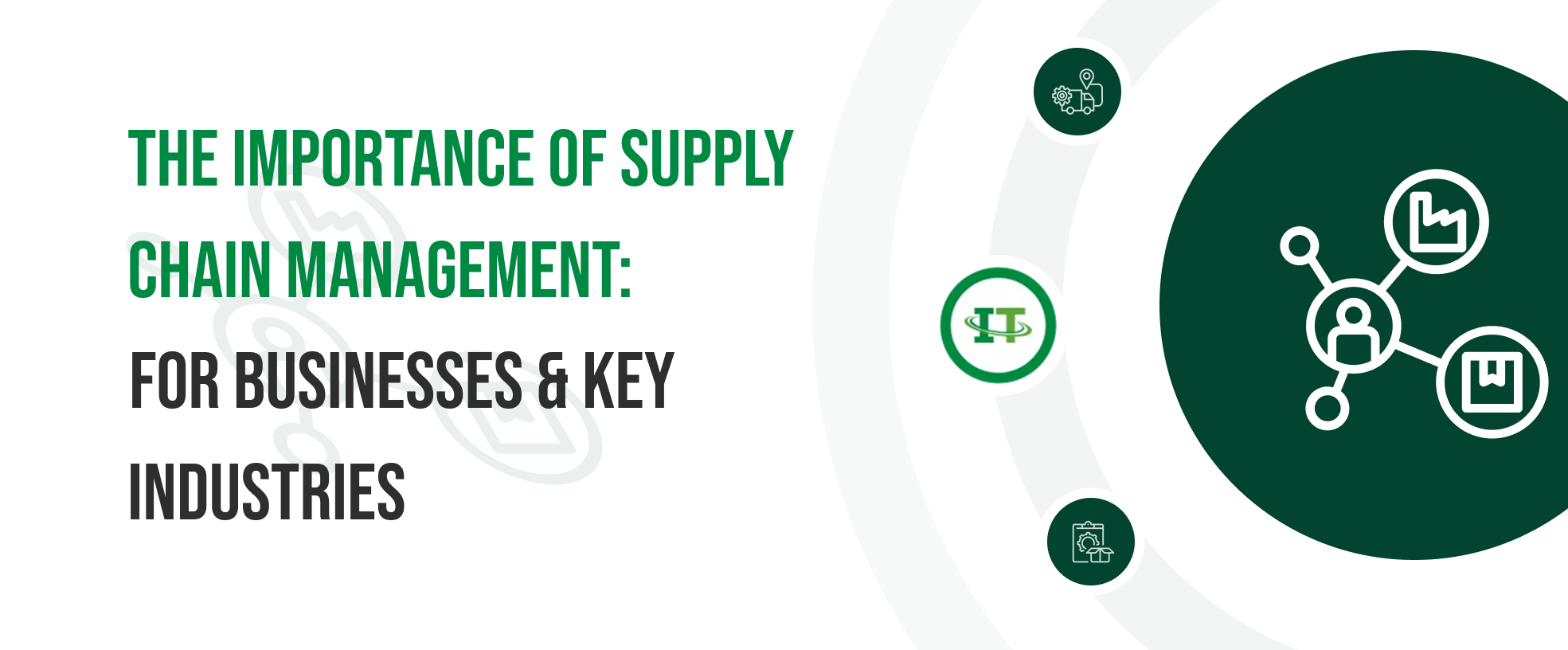What is The Importance of Supply Chain Management?

Ever thought of how medicine, supplies, and other essential items reach you? There is a seamless supply chain behind it!
Do you know the importance of supply chain management? This secret force lies at the core, managing and handling all the supply chain activities. It is the movement of products, data, finances, and raw materials to the end customers.
What Will We Cover?
- What is Supply Chain Management And Why Does It Matter?
- Why is SCM Critical For Business Success?
- Better Client Contentment
- Decreases Operational Expenses
- Improve Financial Performance
- What’s The Importance of SCM in Key Industries?
- Supply Chain Management in Healthcare
- Supply Chain Management in Retail
- What Are The Important Elements of Supply Chain Management?
- Logistics
- Planning
- Supplier Relations
Supply Chain Management is a digital tool used for monitoring, managing and co-ordinating supplies right from the moment they enter the supply chain till they leave to the end customers. It has a considerable importance for the logistics companies that want to have a competitive edge with better organization and co-ordination.
What is Supply Chain Management and Why Does It Matter?
Simply put, Supply Chain Management (SCM) is the strategic oversight of the flow of data, goods, information, and finances throughout the entire supply chain network from raw materials to the completed product. With SCM, you can expect better operational efficiency and cost savings.
SCM has several key components: planning, demand, supply, sourcing materials, etc. These components work together to streamline business operations and build an agile, responsive supply chain.
For better understanding, imagine SCM as organizing an orchestra, where each component like suppliers, manufacturers, logistics, etc. must play in harmony for a perfect performance. If one part fails, the entire operation suffers the effects.
There’s an importance of supply chain management in the industry because it provides efficiency in operations which results in reduced costs, and customer satisfaction.
The Strategic Importance of Supply Chain Management
Supply chain management (SCM) is no longer a strategy. It is an essential force for surviving in a competitive market. A well-managed supply chain enables companies to adjust to market shifts, reduce risks, and benefit from emerging market trends. It also provides better adaptation to issues like raw material shortages, which still allows businesses to meet the demands of their customers.
It’s not just about moving goods, it’s about moving the business forward with speed, intelligence, and reliability.
Let us find out why SCM is so critical for your business.
Why is SCM Critical For Business Success?
Supply chain management (SCM) directly influences increasing operational efficiencies, customer satisfaction, and financial performance. When supply processes align with demand, businesses can significantly reduce costs, improve delivery time, make better decisions, and reap several other benefits.
Better Client Contentment
Supply chain management (SCM) enhances the overall customer experience by ensuring that products are delivered on time and available when required. A well-maintained supply chain can meet customers’ expectations and form a lasting bond.
On-time Delivery:
Supply chain management (SCM) enhances the overall customer experience by ensuring that products are delivered on time and available when required. A well-maintained supply chain can meet customers’ expectations and help build brand reputation.
Product Availability:
SCM software’s demand forecasting and inventory control features help maintain the optimum stock level and reduce the risks of backorders and stockouts.
Decreases Operational Expenses
Demand forecasting is one of the benefits of the SCM software that helps minimize waste and inefficiencies and enables customers to operate smarter, better, and faster.
Inventory Optimization:
Various SCM techniques, such as Just in Time, help avoid overstocks, significantly reduce storage costs, and reduce redundancy.
Logistics Efficiency:
SCM software’s demand forecasting and inventory control features help minimize waste and inefficiencies and enable customers to operate smarter, better, and faster. These features also significantly reduce the cost of freight and improve the speed of delivery.
Improve Financial Performance
Supply Chain Management strategies are essential in deciding the overall financial well-being of any business. Strong Supply Chain Management Software is the backbone on which the economic health of any company depends. Features like better warehouse space utilization can reduce inefficiencies and save costs.
Supply Chain Management leads to enhanced profitability and increased efficiency, leading to better cash flow.
Cost Reduction:
SCM lowers operational costs by reducing waste, optimizing inventory, lowering transportation costs, and improving supplier negotiations. The importance of supply chain management lies in lowering transportation costs and improving relationships with suppliers.
With its demand forecasting feature, companies can avoid excess supplies, overproduction, and inventory. This can save them significantly and prevent damage caused by excess inventory and surplus production, leading to better cost savings.
Revenue Growth:
SCM enhances the overall loyalty of customers who become brand advocates. Companies not only get repeat business with happy customers, but they also get constant revenue streams when they expand into new markets. Moreover, efficient logistics enables companies to scale up their operations and generate additional revenue streams.
Let us move on to discover the importance of SCM in all the top key industries.
What’s The Importance of SCM in Key Industries?
Supply Chain Management is vital in different industries, meeting businesses’ specific requirements. An SCM does everything from delivering temperature-sensitive and time-sensitive medical supplies to meeting consumer demands and managing inventory!
Here’s a look at how SCM is delivering industry-specific solutions in niche sectors like health care
Supply Chain Management in Healthcare
The healthcare sector demands the timely delivery of temperature-sensitive supplies. SCM in healthcare ensures that all these supplies reach their destination points on time. Here are the key benefits.
Key Benefits:
- On-time delivery of sensitive supplies: SCM systems are vital in forecasting demand and delivering supplies on time, which are otherwise very difficult. This saves lives.
- Cost Control: Healthcare facilities can significantly reduce resource wastage, and budget allocations can also be optimized with a strategic planning and sourcing process.
- Regulatory Compliance: SCM aids in tracking and verifying medical supplies to ensure regulatory compliance and patients’ safety.
Supply Chain Management in Retail
Retail is a very competitive industry. SCM has infused life into the delivery and supply of logistics for e-commerce and retail businesses. SCM ensures that the products are sourced, stocked, and delivered with a high success rate.
Key Benefits:
- Fast and Accurate Delivery: Effective SCM minimizes lead times and supports just-in-time delivery models, which are critical for online retail and omnichannel sales.
- Optimized Inventory Management: Advanced demand forecasting and real-time tracking reduce overstock and stockouts, improving turnover rates.
- Enhanced Customer Experience: A well-oiled supply chain allows retailers to respond quickly to trends and offer seamless service, boosting customer loyalty.
Let us quickly look at the essential elements of Supply Chain Management.
What Are The Important Elements of Supply Chain Management?
Supply Chain Management depends on different elements to function properly. Among them, Logistics, Planning, and Supplier Relationships are the most important ones. These 3 elements make sure that the operations run smoothly, costs are reduced, delivery of goods is done on time. Let’s understand them in detail:
Logistics
The importance of logistics management in SCM is in the role of transporting, storing, and delivering goods. It covers everything from transportation, warehousing, to inventory management, which ensures the right products reach the right place at the right time.
Logistics management reduces delays and costs, improves customer satisfaction and retention with the help of tools like TMS and real-time tracking. Thus, it is the heart and soul of the supply chain that connects suppliers, manufacturers, and the customers.
Planning
Planning is an important phase in supply chain management that entails accurate demand forecasting, correct production schedules, and best allocation of resources. Accurate planning makes sure that the production is done in the right amount, waste is reduced, and expectations of the customers are met.
Planning also includes capacity planning, and sales & operations planning (S&OP). Proper planning reduces disruptions and allows strategic decisions, which helps businesses stay ahead in changing markets. More innovative planning means no or little delays, no excess inventory, and optimal resource use.
Supplier Relationships
Building strong supplier relationships with the suppliers is necessary for a consistent product quality, timely deliveries, better flexibility, reduced risk of delays, and other reasons.
Effective SCM needs the selection of dependable vendors, maintaining crystal clear communication, and monitoring performance. Supplier partnership collaborations improve lead times and drive innovations in the business.
Trust and coordination with suppliers guarantees long-term supply chain stability even during disruptions. Thus, good bonds with suppliers help companies prosper and excel.
So, these are the key elements for creating high-performing supply chain tasks that can change with the changing market needs.
Let us now quickly look at the summary and the key takeaways about the importance of supply chain management.
The Bottom Line
Integration and optimization are the two key elements of a successful supply chain. Logistics, planning, and maintaining a healthy supplier relationship are essential for staying ahead in the competitive market.
Key Takeaways:
- Logistics means the timely and efficient movement of goods across the supply chain.
- SCM is essential for your business, enabling better inventory control, cost reduction, customer satisfaction, etc.
- Industries like Healthcare and retail are benefiting the most from SCM.
- Key pillars of logistics management are planning, logistics, and customer retention.
- Managing these components effectively transforms SCM into a competitive advantage.
Frequently Asked Questions (FAQs)
Revealed here are some of the commonly asked supply chain management questions.
1. What is supply chain management software?
Supply chain management involves planning, sourcing, production, and distribution to deliver goods from warehouses to end customers.
2. What challenges are faced in SCM?
Disruptions in the supply chain, ever-rising costs, and imbalances in the inventory are some of the common challenges faced in the SCM.
3. What are the main functions of supply chain management?
Some of the key SCM functions are logistics, planning, inventory control, and demand forecasting.
4. What is the best SCM software?
The best SCM software depends on your needs, such as whether you need real-time analytics or automation features. Some of the best suggestions would be CommuteLogix, Oracle, SAP SCM, etc.
Streamline Your Business Operations, Let The Profits Soar High!
An inefficient supply chain can end your logistics business. Act smartly now and integrate the cutting-edge software CommuteLogix. Get your business streamlined, maximize efficiency, and profits.
Connect with us and get CommuteLogix today!
Irshad Pathan

Web Development Expert
Irshad is a senior technical expert at iCommuneTech. He manages the iCommuneTech's Web Development Team, and has hands-on expertise in web development, Laravel development, Logistics, fleet management, and Supply Chain Management. He mentors the in-house team and enjoys describing his experience in words.
